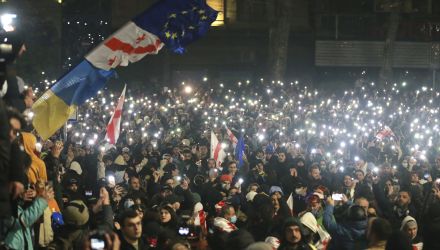The central test of a national intelligence service is how well its analyses and estimates inform policy-makers of probable developments abroad. More than any other, it is this test that the United States intelligence community is failing today.
Consider the case of Iran. Through l978 and 1979, American intelligence profoundly misassessed the revolutionary forces opposing the Shah. For example, in August l978, a Central Intelligence Agency estimate concluded: 'Iran is not in a revolutionary or even prerevolutionary situation.' The intelligence community's failure to illuminate these events exasperated President Carter, provoking him to send a memorandum to the C.I.A. declaring: 'I am not satisfied with the quality of political intelligence.'
Beneath the surface of this case, one finds characteristic failings of the current community in the three key elements of performance: collection, analysis, and service to policy-makers.
First, in contrast to remarkable advances in technical-collection capabilities, collection of information by agents has eroded signficantly. The causes are many: cuts in positions for intelligence officers abroad, dedicated efforts by enemies to expose American agents, and heightened uncertainties about the security of agents' identities. In Iran, America had no network of clandestine agents to see what was actually happening to the mullahs, merchants, and colonels under modernization forced by an autocratic, repressive ruler. Instead, acceding to the Shah's demand, American intelligence restricted its activities to liaison with Savak, the Shah's secret police.
Second, America lacked a small, dedicated group of experts focused on Iran. Such experts would have approached the extraordinary developments of l978 with deep understanding of Iranian society. The inadequacy of current analytic expertise results primarily from the lack of commitment to recruiting, developing, and sustaining competences of professional analysts. But the deterioration of recent years also reflects the estrangement beween the intelligence community and the institutions that maintain our society's storehouses of knowledge, especially universities and corporations.
Third, the Iranian case highlights the problem of interaction between intelligence analysts and policy-makers. With our increasing dependence on the Shah, top officials came to regard his stability as a premise of American policy. As a House Intelligence Committee report concluded: So stable was the premise of the Shah's survival that this 'limited both the search for an accurate understanding of Iran's internal situation, and the receptiveness of intelligence users to such analyses.'
What is to be done? The problems, deep-rooted, are not susceptible to quick fixes. The Reagan administration will be eager to get on with the job. Some things can be done without debate. But the first item on the agenda should be to join with the intelligence committees of the new Congress in consolidating a broad bipartisan consensus behind a major program of reconstruction. The focus of that consensus should be a common goal: to give America the best intelligence capability in the world.
To promote understanding of what will be required to achieve this objective, the intelligence committees of Congress should proceed directly to hold 'preparedness hearings.'Among the questions to be addressed are: l. How important is first-class intelligence in the period ahead? Given the increasing number and variety of events abroad that threaten our interests, the premium on accurate assessment of foreign developments is steadily rising.
2. How can the intelligence community's analytic competence be substantially enhanced? Promising remedies include: establishing career paths that encourage analysts to deepen their expertise for decades; developing relations with outside institutions; and creating a system of well-structured competition within the intelligence community.
3. How should trade-offs between intelligence and other important national values be made? Should Congress declare specific categories of information (for example, about agents) off-limits to normal Congressional oversight - at some cost to Congressional prerogatives? Should a law be passed that outlaws publication of names of agents - at some cost to the independence of the news media? Should relationships between intelligence, and universities and businesses be re-established - at some cost to the integrity of those institutions?
Because of the recent orgy of revelations and restraints, the new administration will be tempted to lower the community's visibility and loosen the restrictions. Some of both is required. Neither will substitute for the public understanding and support necessary to sustain a long-term program to rebuild this most critical function of government.
Allison, Graham. “An Intelligence Agenda.” The New York Times, December 21, 1980





